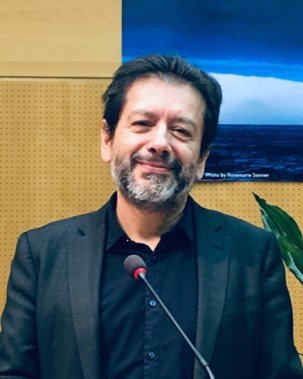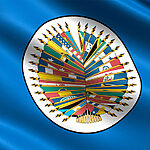Fireside chat with Andres Orias-Bleicher

Andres is the current Chair of the FICSA Legal Standing Committee and has held this position on numerous occasions. After studying law and history, he joined the United Nations system as an editor for the WMO and the Intergovernmental Panel on Climate Change in Geneva. He quickly became involved in the WMO Staff Association as well as the activities of FICSA, as a participant in the activities of various committees, but above all as a member of the Legal Committee for 25 years. He has worked on several advocacy cases in coordination with other FICSA committees and the system’s staff associations, providing support and advice to protect the working conditions and respect of international civil servants in the current context of global change. Andres considers that the incorporation of the new generations into the associative mechanisms is crucial for the improvement of the efficiency of the UN system agencies, the protection of rights and the preservation of working conditions of all staff.
What is your current role in FICSA? What does this involve?
I am the chair of the Standing Committee on Legal Questions. This involves leading the activities of this committee, preparing documents, following up on the priority issues decided each year at the FICSA Council (and also on secondary issues!) and coordinating with the FICSA ExCom, all legal matters in the common system.
What inspired you to join the FICSA Executive/Standing Committee?
More than two decades ago, there was a strong mobilisation in Geneva, calling for the respect of approved and existing rules (principles applicable to post-adjustment, etc.). It was my first experience at FICSA. I have stayed ever since. I have very good friends who spend a lot of their time defending the staff, in New York, Rome, Vienna and in the field. They motivated me to continue.
What do you consider to be the key ways in which FICSA assists other staff associations?
Direct contact with staff representatives, response to concrete demands, proposal of common activities and actions. But above all, the ability to listen during annual councils. Of course, the coordination of joint actions always carries more weight than the actions of a single association.
What has been the most complex challenge you have faced in your role at FICSA?
I remember a difficult period when a staff representative was harassed by the management of his agency, trying to intimidate him for his action. Supporting him involved almost daily monitoring and effort. He ended up retiring at the statutory age, but he did not give up. It was a lesson in resilience.
In your experience, what do you think is the value that staff representation can bring to the organization itself?
Protecting the most vulnerable in a potentially overwhelming bureaucratic structure where managers do not always play by the rules. This staff representation function is ultimately beneficial to all.
What is your advice for keeping a Staff Committee engaged and motivated?
I think this is a difficult question, as this is the main concern of staff associations today. Perhaps the most effective thing is to always be listening to the staff, to all the staff, in the day-to-day work, to show that the association is a support, a mechanism that they can count on at all times.
At the 2022 FICSA Council, the members of the Legal Standing Committee raised unanimous concerns about the protection of staff representatives who have been facing intimidation by their organization’s administration. What can FICSA do to address this problem?
Well, after the testimonies and deliberations, we decided to adopt a resolution, which was unanimously approved at the 75th Council. But apart from this document, which expresses a concern and recalls the obligation of the administrations to respect the right of freedom of association and right of representation of the staff, I think it is essential to maintain dialogue with the administrations and to seek solutions without litigation.
Similarly, there is also a concern that young international civil servants are less and less keen to proactively engage in staff representation. How do you think this trend can be reversed?
I think the bottom line is to show them that staff associations are useful and need new blood and new ideas. Listening to them and taking on board the ideas they bring is the first step. Then you have to convince them that the associations are not purely abstract and boring entities, but that they are a space in which they can express, share, help and protect themselves if necessary.
Today, FICSA has 86 members associations and unions in 13 countries, representing more than 38,000 international civil servants worldwide. What are the advantages and disadvantages of enlarging FICSA membership?
I could say that on the whole, it is both an asset and a strength. A growing federation means in principle more members and more participation, which is an advantage. But at the same time it is a greater responsibility for FICSA and certainly more work.
What are the most valuable lessons that Staff Associations have learned from the COVID-19 pandemic?
I think it was a very sobering period. First of all it forced us to change the paradigm of physical presence and realise that many things can be done virtually. But we also learned that not everything can be done remotely. There was a lot of internal debate in the agencies about the need for face-to-face interaction, but at the same time a re-evaluation of the volume of expenditure, with the implications of that reasoning for staff. Therefore, staff representatives must now be very vigilant to avoid abuses of “virtuality”.
Being a staff representative often involves studying complex legal and technical issues. What resources would you recommend to new staff representatives?
The first thing, for any new member of a UN system agency, is to know the internal rules and regulations of the entity where he or she works. From there it is possible to progressively escalate to the common system. For that, there are paper books (which are still and will continue to be very useful) and a wealth of information on the Internet, on the common system, on the courts, on jurisprudence, etc. Everyone will find his or her own path, according to his or her own interests and aptitudes.
Looking ahead, what do you consider are the key challenges facing Staff Associations in the next 5-10 years?
The main challenge is the accelerating change in the very perception of the international civil service, as a reflection of changes in international politics, which have a dimension of unpredictability. We can see some trends that will have to be addressed, such as the argument of “flexibility” in employment relations, used to cut or diminish acquired rights. This results in a precarisation of working conditions for young people in the mainstream system. Ultimately, it results in less service and support to the most vulnerable communities, which require protection from international civil servants. Therefore, for staff associations, protecting the existence of the international civil service is a challenge in itself.










